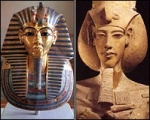21 June 2006
Statue attack fuels fears of an Islamist Egypt
 A religiously motivated attack on statues at a museum in Cairo has sparked outcry in Egypt and fuelled fears that the country is veering towards an Islamic state
A religiously motivated attack on statues at a museum in Cairo has sparked outcry in Egypt and fuelled fears that the country is veering towards an Islamic state
The attack on three artworks, by a black-clad and veiled woman screaming, "Infidels, infidels!" followed a fatwa issued by the Grand Mufti of Cairo, Ali Gomaa, which banned all decorative statues of living beings.
 | |
| |
It led to furious criticism of the mufti from Egyptian liberals. In a televised debate with the mufti after the attack, one poet raged that "the prevalent religious discourse in the country encourages terror".
Although the ancient treasures of Egypt have been protected under Islam so far, an increasing extremism in the country could make statues such as the quartzite head of Nefertiti, the colossus of Amenhotep, and the golden death mask of Tutankhamen possible targets in future.
At the scene of the attack, in the villa and museum of the Egyptian sculptor, Hassan Heshmat, guards said they had been woken in the middle of the night by the woman's shouts and the sounds of destruction.
"It was a fully covered, religious woman," said Raisa Intesar, who looks after both the museum and Mr Heshmat, who is now 86. "She had jumped over the wall. We rushed out to stop her but by the time we had overpowered her, she had destroyed three statues."
The damaged works included Motherhood, a piece featuring three delicately carved heads, all of which had been snapped off. Also damaged was a smaller piece, The Victory Leap, Heshmat's tribute to Egyptian troops in the 1973 Yom Kippur war.
But the patriotic sentiment of the work was lost on the attacker, who was intent on following a religious imperative. "She had been listening to the mufti, and was following his orders," Ms Intesar said.
In Islam, representations of the human form and potential idolatry are particularly sensitive topics and helped to fuel the riots over the depiction of the Prophet earlier this year.
So, in Egypt, which has become markedly more conservative in recent years, artists such as Mr Heshmat now find that national pride is losing out to religious fervour.
The attack exemplifies the clash of secular and religious societies in Egypt where, on the streets of Cairo, beauties in low-cut tops mingle with veiled women who walk behind their husbands.
"We are seeing an increase of conservative, Islamist feeling," said Nabil Abdel Fatah, from the Al Ahram centre for Political and Strategic studies in Cairo.
"The Islamisation of Egyptian society is happening from the bottom up, and now it has reached the middle classes - the doctors, the lawyers.
"Over the next few years political Islam will grow and grow," he added. "The duality between secular and religious is very dangerous and will lead to a very serious conflict in Egyptian society.
We are already seeing terror attacks. And we will see new radical groups who will want to change the state in the most basic way - by suicide bombs and assassination."
Comfortably installed in the cafe at the top of Egypt's parliament building, 72-year-old Sheikh Said Askar smiled benignly at such ideas.
Sheikh Askar is one of 88 members of parliament for the Muslim Brotherhood, whose offshoots include Hamas, now in power in the Palestinian territories, and which seeks to impose Sharia law throughout Egypt.
Although he is also a long-serving scholar at Cairo's al Azhar mosque, from where the mufti issued his fatwa on statues, he said the Brotherhood will use its growing voice in parliament - not bombs - to effect change. "I want to see Egypt become an Islamic state," he said. "We are near to that."
As little as a year ago, such an idea would have been fanciful. Sheikh Askar was locked up ahead of last autumn's parliamentary elections, from which the Brotherhood was banned.
Running as independents, and despite widespread government interference, its members markedly exceeded expectations by winning enough seats to become the main opposition. Had it not been so restricted, some say, it could have won.
"I understand that an Islamic Egypt scares the West," said Sheikh Askar. "But the secular government has failed the people. Now our group will spread the glory of Islam."
09:23 | Permalink | Comments (0) | ![]() Facebook |
Facebook |



















The comments are closed.